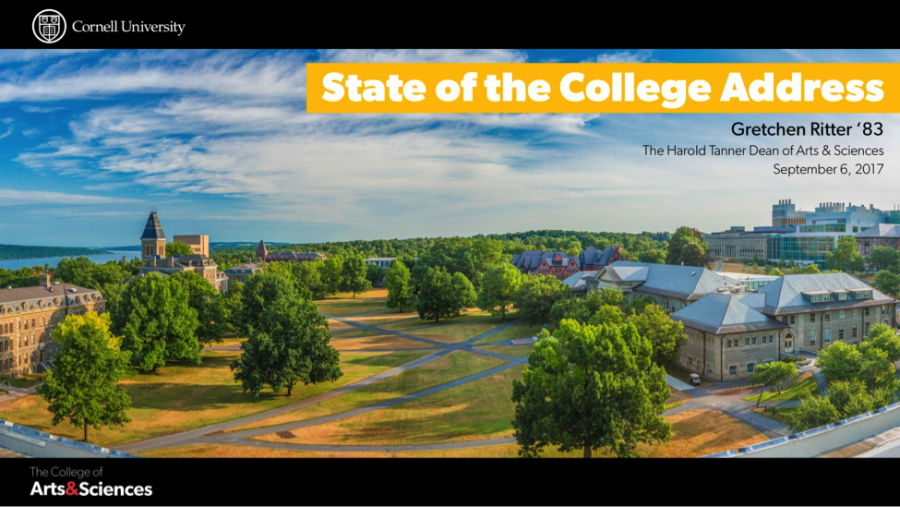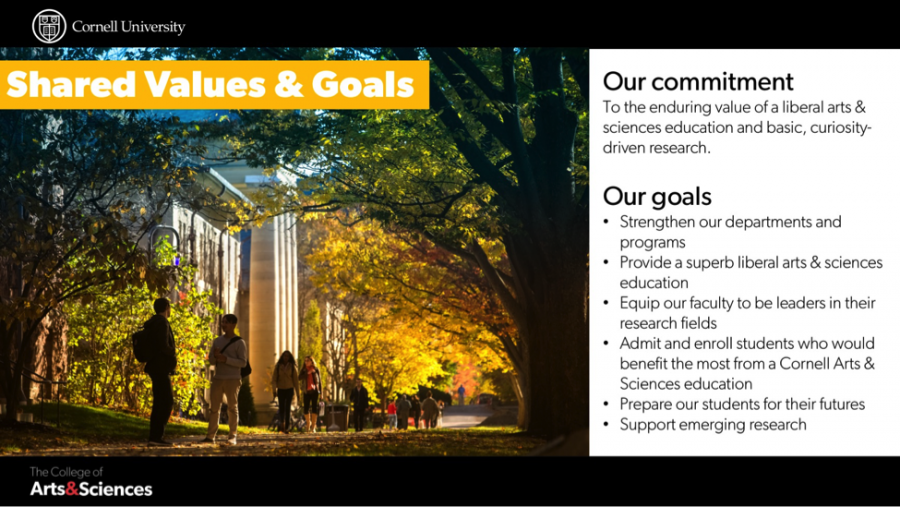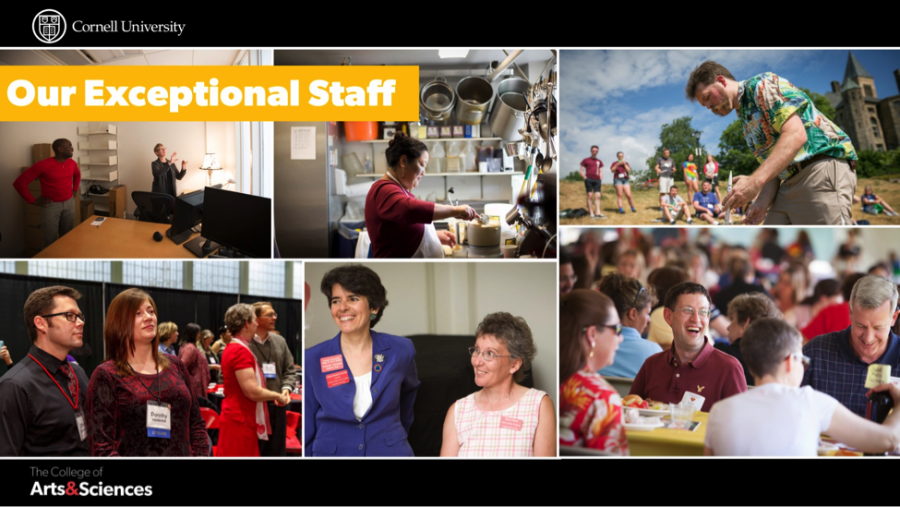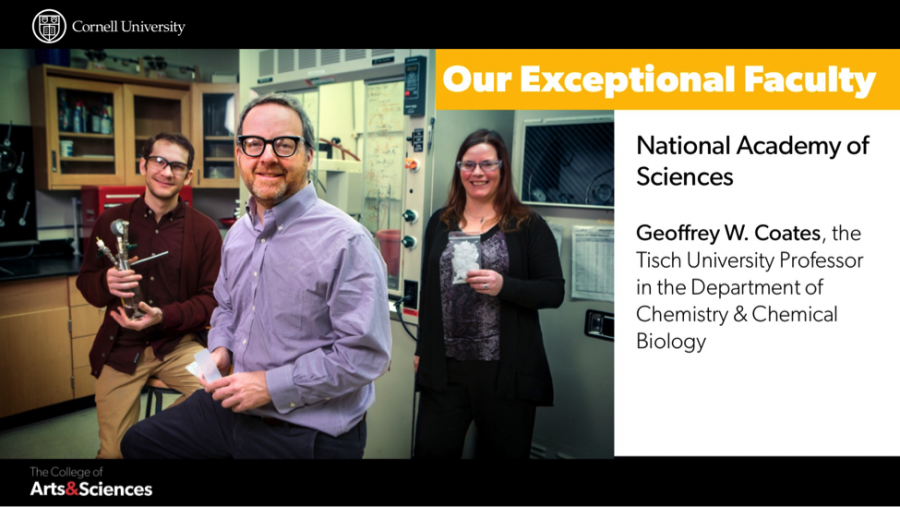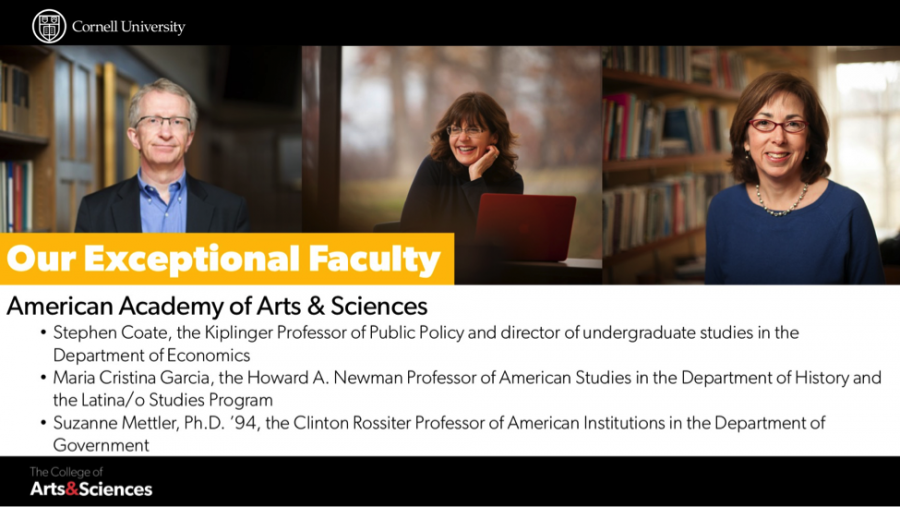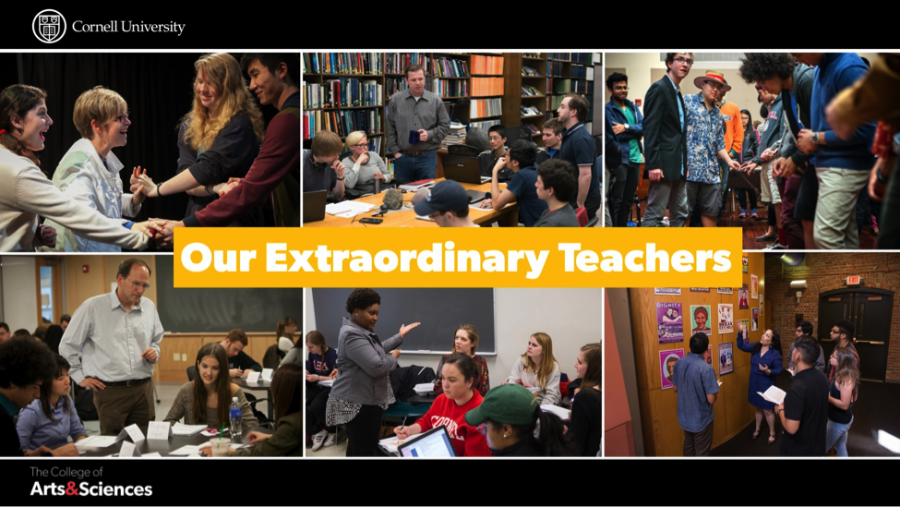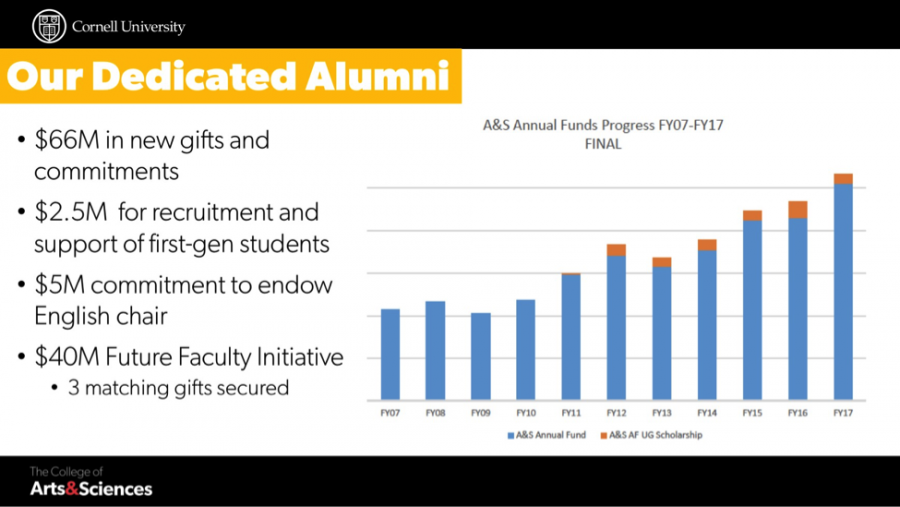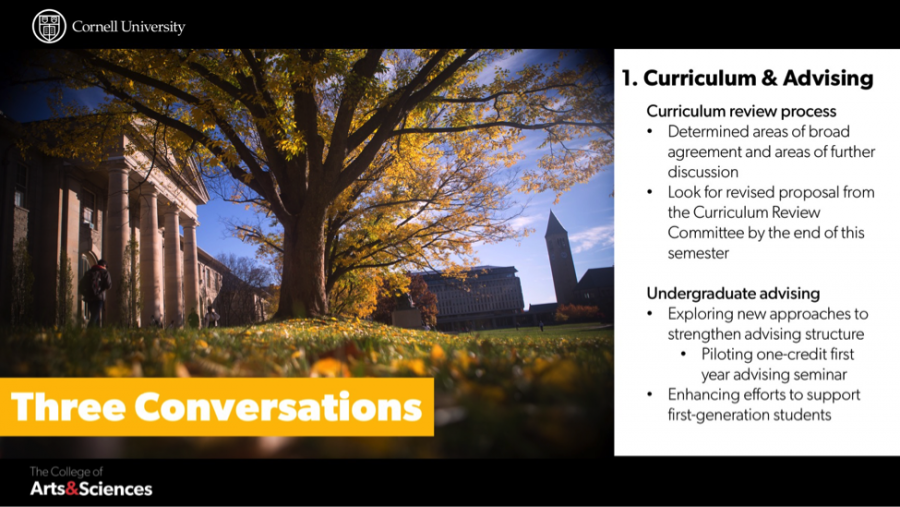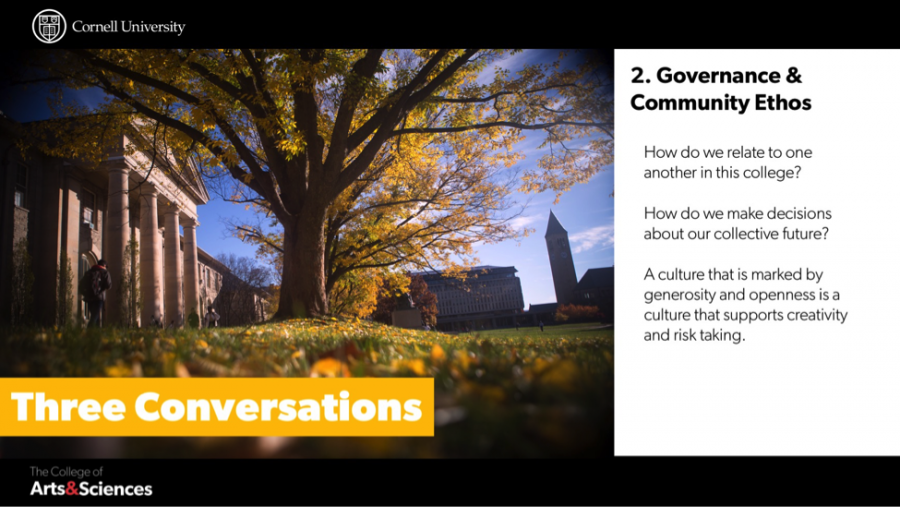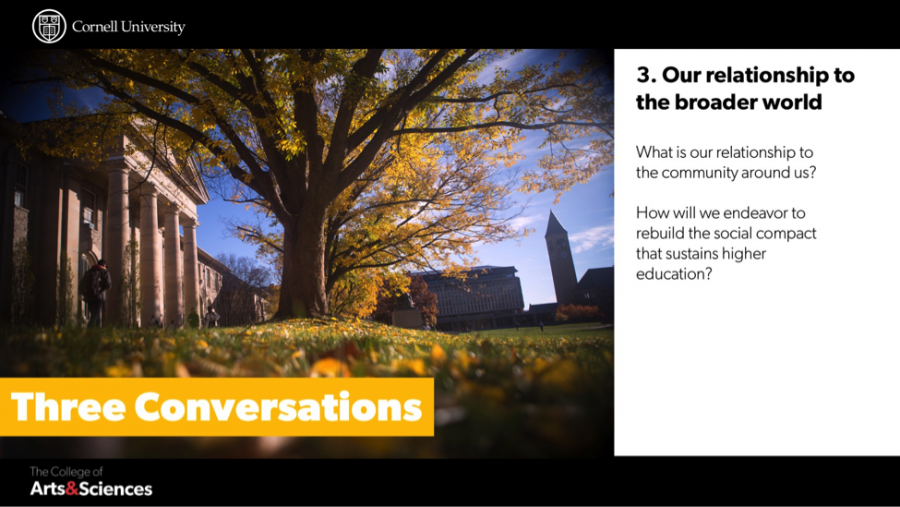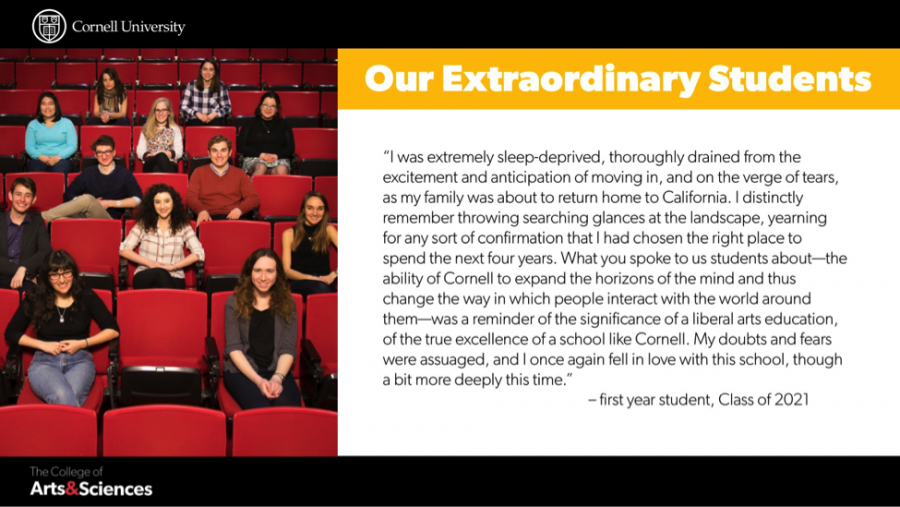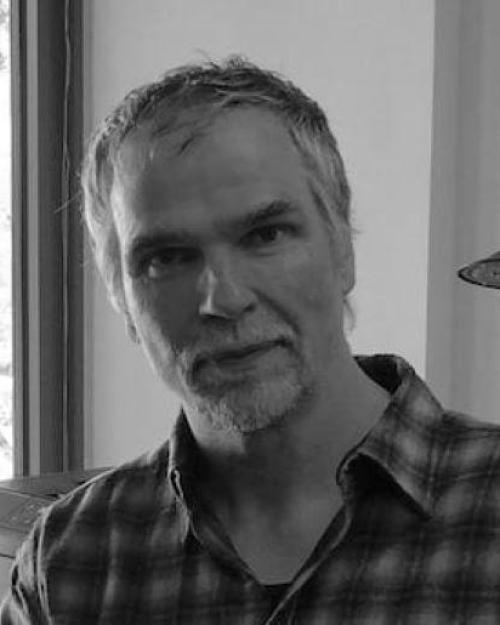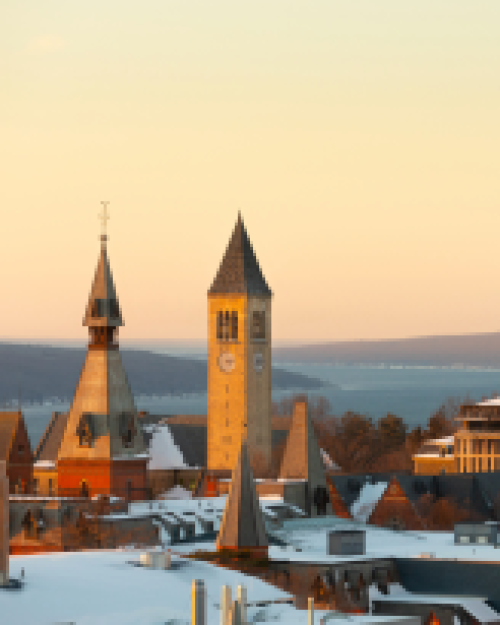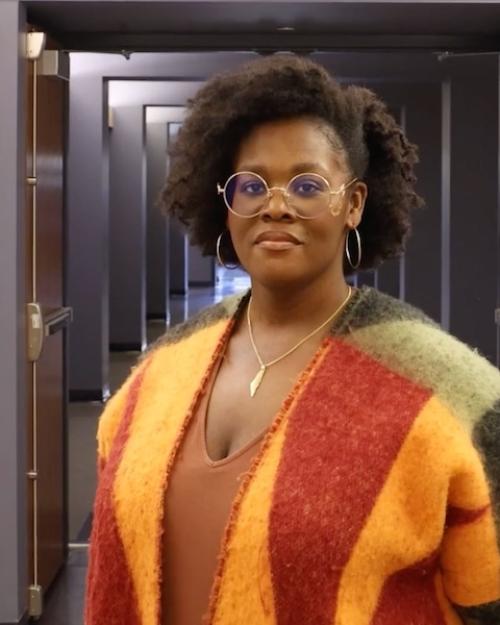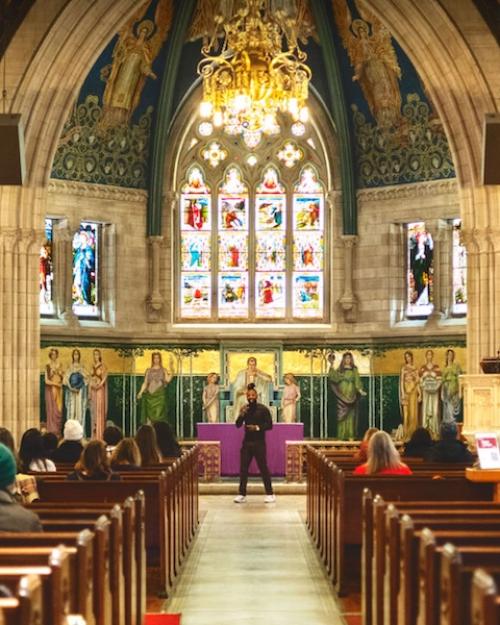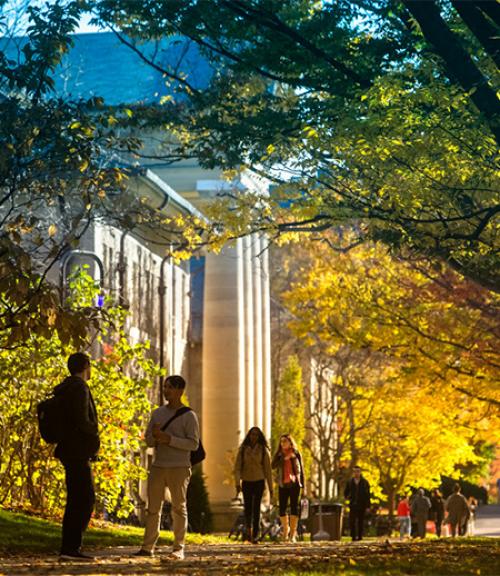State of the College Address
Gretchen Ritter, The Harold Tanner Dean of Arts & Sciences
Cornell University
Thank you all for coming together today.
It was four years ago that I arrived at Cornell to become dean of the College of Arts and Sciences. I was incredibly excited to be returning to my alma mater, to help lead a college that I love – one that is unique and unparalleled in my experience in higher education. As I begin the last year of my first term as dean – I want to reflect with you on where we have been and consider the path ahead. It has been both an exhilarating and daunting journey, but one that has reaffirmed my commitment to our mission.
When I met with our new students a few weeks ago, I asked them to think about the purpose of college. I find our new student convocation to be a great opportunity to reflect on our broader purpose. Similarly, I might ask all of us today to reflect on our collective enterprise as we consider our recent past and look forward to our future as a college.
The past four years have been marked by both achievements and challenges. You are well aware of the challenges. Over the course of my time here, I have served under five presidents and three provosts. Tragically, we lost our thirteenth president, Beth Garrett – a dedicated and visionary leader – only eight months after her arrival.
Beyond these leadership transitions, our budgetary challenges have had the biggest impact for all of us. In my first year as dean, Cornell launched a new budget model that distributes tuition based on student enrollments. While the new model brings greater transparency and accountability to Cornell’s budget structure, it does not fully recognize the value or importance of the small class experience – something that we hold dear in this college. In my second year as dean, the university uncovered a significant budget shortfall that led to a mid-year multi-million dollar pullback on our allocated budget, followed by a further period of budget stringency. This led to reduced hiring levels over the last three years, and one year in which the tenured faculty received bonuses rather than permanent raises.
This may sound like a daunting record of difficulties. And I won’t deny that all of us – the deans, your department chairs and program directors – have lost sleep on occasion as we’ve sought to navigate all of this. In a place where students cycle through on four year terms, research proceeds on a long trajectory, and scholarship builds over generations, disruptive change can be an unwelcome stressor.
But what gets us through these trials is the knowledge that we share fundamental values and commitments, and that these values and commitments have yielded significant successes along the way.
First and foremost, we are guided by a commitment to the enduring value of a liberal arts & sciences education and to basic, curiosity driven research.
We offer students a genuine education. For as former Cornell president and classics professor Hunter Rawlings writes, “a genuine education is . . . the awakening of a human being.”
Our students are here to learn, to change and to grow. We are here to startle them awake, to show them the possibilities of what paths they might choose and to challenge them to be their best selves.
As I’ve said before, “We call it a liberal arts and sciences education because of its ability to liberate the mind – to make the familiar unfamiliar; to open us to new ways of understanding or imagining the world; so that the world ahead is not simply a place you travel through but a place that you discover, or a place that you help to create.”
I firmly believe that our best chance to address the most pressing challenges in our world lies in the varied disciplines and perspectives represented in this college, which our students and every one of you bring to bear through the exploration and understanding of our world and of humanity.
All of our decisions are driven by this sense of purpose: across the humanities, social sciences and sciences – how do we keep all of our departments and programs strong? How do we continue to provide a superb liberal arts & sciences education to all of our students? How can we best equip our faculty to be leaders in their research fields? How do we keep in mind the longer term as well – looking ahead to see what new research opportunities are emerging and planting the seeds for future growth in those areas?
Over these past four years we have worked to ensure that faculty, students and staff have the resources and conditions necessary for continued and enhanced excellence. This will always be our goal.
In the end all of this is driven by you – our exceptional faculty and staff. You are the heart and soul of this college and its collective future. Part of supporting excellence means recognizing your achievements and making your work visible to our campus community and beyond.
Through all of the transitions and challenges we have experienced over the past decade, we have been fortunate to have our incredibly talented and dedicated staff working for the betterment of this college. I’m speaking of people like Marti Dense.
Marti has been central to the Latina/o Studies Program since its founding in 1985. Beyond her vast knowledge of Cornell and her sensitive and effective management of the program, she is a highly visible member of the community. She is the face and heart of this program. Students seek her out for her compassionate and collaborative support. The students have even named an award in Marti’s honor.
Like Marti, Rosemary Barber goes above and beyond. On an early Sunday morning in March, a pipe burst on the roof of Clark Hall, directly above the Physics “learning suite.” Within an hour Rosemary, the course scheduling assistant in Physics, was at work with her manager, Craig Wiggers, and by 6pm they had rescheduled over 60 classes and discussion sections. Rosemary notified all the faculty, TAs and registered students of their new classroom locations, and put signage up redirecting everyone to the new classrooms. This was no small feat. It turned out they couldn’t use those 10 classrooms for the remainder of the spring semester.
In a college as large as ours, there are a variety of urgent issues that come up every day and we have our staff to thank for remaining calm in the eye of every storm. They schedule meetings, plan events, manage websites, fix computers, process receipts, recruit, admit and advise students, tell our stories of research and discovery and raise millions of dollars so that we can fulfill our mission as a college. Our staff are our backbone. Will all of the faculty in the room please join me in congratulating and thanking our staff?
I envy our students, for the opportunities that they have to learn from and work alongside of all of our faculty. Every year, when I read about our most recent inductees into the national academies, or the files for promotion to tenure, or the citations for our teaching and advising awards, I feel privileged to be your colleague.
This past year, Geoff Coates, professor of Chemistry, was named to the National Academy of Sciences, while Suzanne Mettler (Government), Maria Cristina Garcia (History) and Steve Coate (Economics) were all named to the American Academy of Arts and Sciences.
The tenure files that come forward to the dean’s office show that we have a bright future. We are fortunate to have an accomplished and creative group of up and coming faculty who will lead our departments and programs in the years to come.
Examples of the talented faculty members who have recently been awarded tenure include: Lionel Levine (Math), who conducts research on probability and combinatorics; Austin Bunn (PMA), an award winning author of short stories & screenplays; and Lucinda Ramberg (Anthro & FGSS), who works on gender and sexuality issues in south India. The year that Lucinda was awarded tenure she also won three major national awards for her impressive book, Given to the Goddess.
Our faculty are not only renowned for their research, but also for their dedication as teachers and advisors. Among this year’s winners of the Carpenter Award for Outstanding Advising, three were from the College of Arts & Sciences – Austin Bunn from PMA, Michael Goldstein from Psychology, and Ella Diaz from English. Ella has been an exceptional mentor and advisor for her students. She studies and teaches about the Chicano and Chicana arts movement, and she often brings students to see murals and exhibits and meet some of the artists. This year’s Weiss teaching award winners included Steve Strogatz in Math and Sara Warner in PMA, who were recognized for their extraordinary commitment to our students. Austin, Mike, Ella, Steve and Sara – all of them are opening our students to a sense of wonder about the world and equipping them to help create our collective future.
One of this year’s Weiss lecturer awards went to Jim Blankenship from Molecular Biology and Genetics, a department that we share with CALS. Jim has been helping students to learn biochemistry here for decades. We are incredibly fortunate to have talented lecturers who commit themselves every day to helping our students advance academically, like Jim in biology, or Jennifer Wissink in Economics, or Happiness Bulugu in Africana Studies.
I am heartened by the dedication of our alumni as well. Without the engagement and financial support of our alums we would be a weaker college – fewer faculty would be retained or recruited without faculty endowments; fewer economically disadvantaged students would attend the college without scholarship support; and we would not have Klarman Hall – the new humanities building that has provided a sense of community for faculty and students from across the college.
I devote nearly half of my time to fundraising activities – and it is time well spent. This past year, the college secured over 66 million in new gifts and commitments. That’s the second highest fundraising year in our history. What makes this year’s achievements all the more extraordinary is that it did not involve a building project. Instead, the money will all go to people – including a $2.5M gift to support first generation college students; and a $5M commitment to endow the chair of the English department. We are creating more endowed faculty positions as well, under the auspices of the Future Faculty Initiative, a $40M fundraising effort that was launched with a $10 million dollar gift from Barton and Susan Winokur for a 3-1 matching challenge. And there is more good news soon to come. All of this is done through the excellent efforts of our alumni affairs and development staff, who, under Associate Dean David Whitmore, work in partnership with the central development office. We are also increasingly relying on our chairs, directors and students in this area. Why? Because the faculty and students are often the best equipped to tell our story – about what we do here and why it matters.
Looking back over the last few years, there is much to celebrate and be proud as members of this college community. Looking ahead over the next year or more, I want to frame three conversations concerning our collective future.
Curriculum and Advising
The first conversation involves curriculum and advising.
For the past 18 months we have been engaged in a curriculum review process that has, for the first time in nearly two decades, brought faculty together from across the college to identify the value and purpose of the Arts & Sciences curriculum. Early last spring, the Curriculum Review Committee released a draft proposal for a new Arts & Sciences curriculum, then sought feedback from stakeholders both within and beyond the college. At the end of last semester, the committee presented the results of those discussions to the faculty. The presentation showed broad areas of agreement and identified a real opportunity for innovation. They also identified several areas – including interdisciplinary teaching, the precise distributional requirements, and foundational courses – that deserve further discussion among the faculty. Over the course of this fall, the committee will address those issues in greater depth, with the goal of releasing a revised proposal by the end of the semester. One of the greatest contributions we make to the world is through education. I am grateful to all of you for participating in this important conversation.
How we advise our students is the other part of our discussion about undergraduate education. Feedback from students shows that far too many of them never really connect with a faculty member while they are here. A lack of strong and consistent advising, especially for first year students, can have a negative impact on their academic progress, and make them more vulnerable to personal stumbles. Inadequate pre-major advising may also make our students more open to transferring to other colleges and schools where they receive more structure and engagement from the outset. In some parts of the college faculty feel overwhelmed because there are far more students than they can meet with given the size of their faculty. In other areas, faculty sometimes feel ill equipped to provide appropriate guidance to first year students whose academic interests may be far afield from their own. We have an experienced and committed professional advising staff in the college, we are very fortunate for that, but we have long prided ourselves on being a college where all students will have an opportunity to be advised by a faculty member. How do we do that well given the pressures and constraints we are experiencing in different parts of the college?
Under the guidance of Professor Rachel Bean, our new senior associate dean for undergraduate education, and Bonnie Comella, our recently hired director of advising, we are exploring various approaches to strengthening our advising structure, including piloting a one credit first year advising class, and enhancing our efforts to support first generation students who enroll in college. We will be looking to the faculty of the college to help us assess these efforts and to determine how we should move forward in this area.
Governance and Community Ethos
The second conversation about our future concerns governance and community ethos. How do we relate to one another in this college? How do we make decisions about our collective future?
The first part of this conversation concerns governance and process. One of our goals in the dean’s office is to promote transparency and fairness. Too often in decentralized organizations, resources and recognition are distributed in an ad hoc fashion, where those who have the best networks or who are the most persistent in articulating their interests are the most successful in obtaining resources or getting recognized. So the question is, can we, through shared governance, develop an approach for distributing resources and recognition that elicits greater trust because it works to fairly advance the success and well-being of all parts of our college? This will not be an easy task – it means, among other things, that we must work through our differences to come to agreement about what criteria matter in the distribution of resources and awards. It also means accepting that there may be short term trade-offs in which great ideas, important interests and promising proposals may have to wait a year or two before getting the support they deserve.
Last month we began a discussion with the chairs and directors about long term academic planning and how decisions about hiring approvals are made. We shared information about the current number of faculty in both short term and long term positions in the college. We also talked about developing an approach that would enable departments and programs to have a greater ability to plan and project hiring opportunities over a five-year period. We want to preserve and enhance excellence across the college, while responding to long term changes in course demand and emerging new research areas. We have asked the chairs and directors to bring the information that we shared back to their departments and programs for discussion. Over the course of this year, in dialogue with all of you, we hope to be able to carry forward this conversation about academic planning.
The other part of this conversation concerns our community ethos. Our culture as an academic community includes a deep commitment to the ideals of open inquiry and critique. We seek knowledge and offer an analytic perspective on the world that is independent and not beholden to various social interests. The value of academic freedom is one that we must cherish and uphold – whether it be for scientists sharing their work on climate change; social scientists examining the impact of inequality on social mobility; or humanists exploring the social and historical narratives that construct or divide communities across geographic or economic landscapes.
Yet I also think it is worth examining our community ethos in our daily interactions with one another. As a college we proudly proclaim our commitments to inclusion, opportunity, and free exchange. Yet, I fear that on occasion we fall short in our efforts to honor those values. In these times of polarizing differences and in the wake of recent financial constraints we all face the challenge of how to create a community ethos that emphasizes respect and generosity; and how to approach discussion or debate with an open heart and a willingness to listen and learn about the viewpoints and perspectives of others.
A culture that is marked by generosity and openness is a culture that supports creativity and risk taking.
I want to thank many kind colleagues in this college – both faculty and staff– who exemplify these values of openness and generosity, and who can serve as guideposts to this important conversation about how best to knit together our commitment to academic freedom and open inquiry with a community ethos that values trust, inclusion and dialogue across differences. As a starting point, we will be putting together forums on these topics this coming year.
Our Relationship to the Broader World
The third conversation I would like to start about our collective future concerns our relationship to the broader world.
We live in a moment of deep social and political polarization; a moment of increasing economic inequality. Suspicion and distrust of higher education – and particularly of elite higher education – has grown in recent years. Perhaps we think that this does not really matter to what we do here at Cornell. But it does. It makes a difference to what classes our students enroll in, what levels of public research funding is available to us, and to what extent our work influences public conversations on everything from climate change to the role that history and the arts play in creating a sense of community and purpose in our society. In this context, how will our work as educators, researchers, and staff help us to address these divisions? What is our relationship to the community around us? How will we endeavor to rebuild the social compact that sustains higher education?
I am encouraged that our colleague, Gerard Aching, is now one of the public engagement fellows in the provost’s office. Many of our faculty and students are doing important work that engages the broader community beyond the campus.
Under the auspices of the Prison Education Program, Bruce Levitt from PMA, Jamila Michener and Joe Margulies from Government, and others have been working with incarcerated men in the upstate prison system, and helping our students to understand the impact of high rates of imprisonment on our community.
Faculty from the Center for the Study of Inequality, under the leadership of director Kim Weeden, are working on several projects that deal with the geography of social polarization and inequality in our country. There are now over 300 students enrolled in the Inequality Studies minor.
Finally, one of the first Arts & Sciences projects that was funded by Engaged Cornell is being led by Melissa Hines from Chemistry. Melissa and her colleagues are working with graduate students to science education modules for K-12 educators in upstate New York. This program not only helps our graduate students, it also provides great materials for local science teachers, enhancing their success in turning on young students from all backgrounds to the wonders of science. Guided by these inspiring examples, over the coming year we will seek to broaden the conversation about our commitment to engagement with the larger society and local community here in upstate New York.
Conclusion
There are many things that make me optimistic about our future. Having a provost who is committed to strengthening our academic core. Having a new president who gets what is great about Cornell, who deeply supports the mission of this college, and whose values align with our commitments to academic excellence, free speech, and inclusion. Having the exceptional faculty and staff who are gathered together in this room – all of this makes me optimistic.
I am heartened as well by our amazing students. I want to end by sharing with you a note I received from a student, reflecting on my convocation address to incoming students a couple of weeks ago.
He wrote:
I was extremely sleep-deprived, thoroughly drained from the excitement and anticipation of moving in, and on the verge of tears, as my family was about to return home to California. I distinctly remember throwing searching glances at the landscape , yearning for any sort of confirmation that I had chosen the right place to spend the next four years. What you spoke to us students about – the ability of Cornell to expand the horizons of the mind and thus change the way in which people interact with the world around them – was a reminder of the significance of a liberal arts education, of the true excellence of a school like Cornell. My doubts and fears were assuaged, and I once again fell in love with this school, though a bit more deeply this time.*
*This is an abbreviated version of the letter. Faculty or staff interested in reading the full letter can email as_dean@cornell.edu
It is because of you and what you do day in and day out that our students feel affirmed in coming to a place that will expand their horizons and change their interaction with the world. That, and the contributions we make through knowledge and discovery, is the difference that we can make every day.
Thank you.
